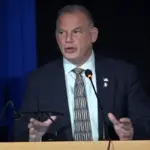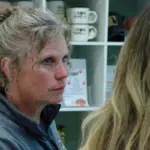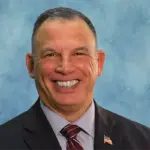by James Rada, Jr., photography by Nikola Tzenov
When everything in Carroll County, the state, and the country seemed to shut down earlier this year because of COVID-19, Little People’s Place Child Development Center in Westminster remained open. This was primarily because essential workers still needed daycare for their children if they were to continue doing their necessary jobs.
While the center continued operating, the staff had to clean the classrooms even better than they usually did to ensure that the few students who continued coming to the center didn’t get sick. The deep-cleaning regimen includes overnight fogging of the classrooms. The extra cleaning has been worth it, though, since the center hasn’t had a case of COVID-19 connected to the school, but the price tag is a heavy burden.
The cleaning cost owner Mary Burke an extra $1,000 a month at a time when the school’s enrollment was at roughly 15 percent of normal.
“We could have no more than 10 children in a classroom, but we still used all of the space we typically used,” Burke said.
Needing additional income, she applied for the federal Paycheck Protection Program to help pay staff salaries, but it wasn’t enough. To keep the center and its 37 employees working, Burke and her husband had to dip into their retirement and used $90,000 to make ends meet.
Finally, she received a Carroll Rebound Grant to help cover the extra cleaning costs the center was incurring because of the pandemic. The Carroll County Department of Economic Development awarded hundreds of grants totaling $4 million to county businesses and nonprofits from the Carroll County Coronavirus Relief Fund Plan.
The county awarded the grants to help with the extra expenses COVID-19 caused. Businesses can use the grants for information technology upgrades and e-commerce programs, marketing, employee training, commercial cleaning, professional services, equipment or vehicle expenses, and other COVID-19 business and health-related expenses for things like personal protective equipment, supplies, Plexiglas shields and masks. However, the money can’t be used to replace lost income, pay lease or mortgage payments, utilities, insurance or expenses not related to COVID-19 pandemic effects.
Dr. Marshall Fesche, a partner with Finksburg Dental Associates, is using the Rebound Grant his practice received to purchase air purifiers for the offices.
“We’ve probably done everything one can do with a dental office to make it safe for both patients and staff,” Fesche said.
Adding the air purifiers to the offices is an extra step above and beyond what businesses must do.
“Probably most offices don’t have it,” Fesche said.
When he started pricing suppliers of air purifiers, he was “shocked” at the cost. The best price he found for an effective system was $800 per room.
“We feel that this will make our offices a lot more desirable to work in,” Fesche said.
The Carroll County Board of Commissioners unveiled the Carroll Rebound Program in June as one way the county could help businesses hurt by the pandemic. The Carroll County Department of Economic Development awarded up to $2,500 for sole-proprietorship businesses, up to $5,000 for nonprofit organizations, up to $5,000 for businesses with two to 10 full-time equivalent employees, and up to $8,000 for businesses with 11 to 50 full-time equivalent employees.
“Our business and nonprofit communities continue to suffer the effects of COVID-19 and the economic downturn,” County Commissioner and board Vice President Ed Rothstein said at the time. “Carroll Rebound uses Coronavirus Relief Fund dollars to provide direct support to our impacted small businesses and assist them as they stabilize and revitalize their enterprises.”
While the grants are a welcome help to many businesses, they are only an aid, and it may not be enough to help some, particularly if a business’s industry can’t recover. That’s the problem Laura Hennigan, president of Dreamers Travel in Hampstead, is facing.
“Our industry hasn’t reopened yet,” Hennigan said. “We don’t know day-to-day what is going to happen, but we’re still working.”
Even after receiving a Rebound Grant, she had to move her business from a storefront operation to home-based business. Even though she has continued working, she has had nothing to work with. Cruises and resorts aren’t open.
“Agents work on commission,” Hennigan said. “You don’t get paid until a person travels, and no one is traveling.”
She noted that some destination islands are beginning to open with restrictions, allowing for some travel. This raises another problem of whether someone wants to deal with the restrictions, the possibility of cancellation, and the chance of getting sick.
“Right now, there’s not enough travel to earn a salary,” Hennigan said.
And although Little People’s Place Child Development Center has been lucky enough to remain open, that’s not the case with many daycare centers. Not only were they forced to close along with many Maryland businesses, when they could reopen they couldn’t earn enough income from the required smaller class sizes to cover the additional costs COVID caused. The major reason Little People’s Place Child Development Center was able to weather the storm was because of the Burkes’ willingness to sacrifice part of their retirement savings, which is something no grant can be used to replace.
“We are also so blessed because we own our building and don’t need to rent space,” Mary Burke said. They didn’t have to worry about making a mortgage payment with no money coming in.
It wasn’t until the fall that Burke said she saw enrollments at the school starting to move upward. The center increased its Wi-Fi bandwidth to allow more students to use computers at the same time. This also allowed elementary students who attend public school classes virtually to come to a classroom at the center where they can attend their virtual classes while still being in an actual class with a teacher on hand to help if needed. It also allows students’ parents who need to return to their own job to do so and not have to act as their children’s schoolteacher.
Finksburg Dental Associates also seems to be returning slowly to normal. While the practice was closed because of the state’s lockdown orders, staff was purchasing personal protective equipment that they expected to need. Also, Fesche and his business partner developed a plan for how the practice could operate safely when it reopened. When the business could reopen, it was ready for patients.
“There was an enthusiasm among the staff, for the most part, to get going again,” Fesche said. “The patients came back when we reopened, and we didn’t have any problems.”













